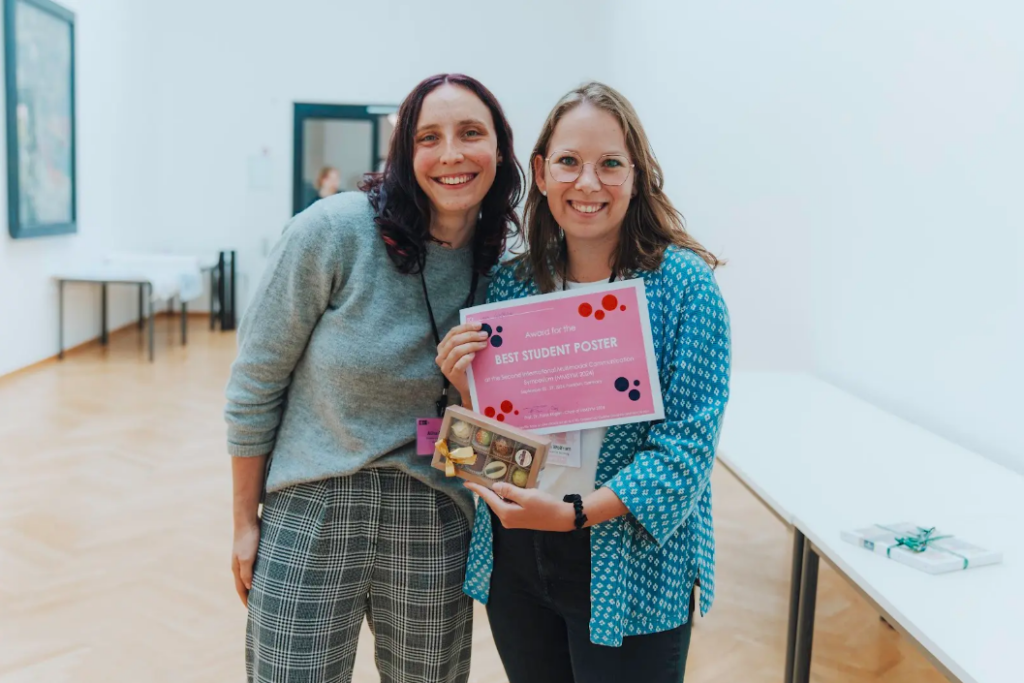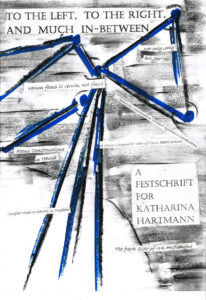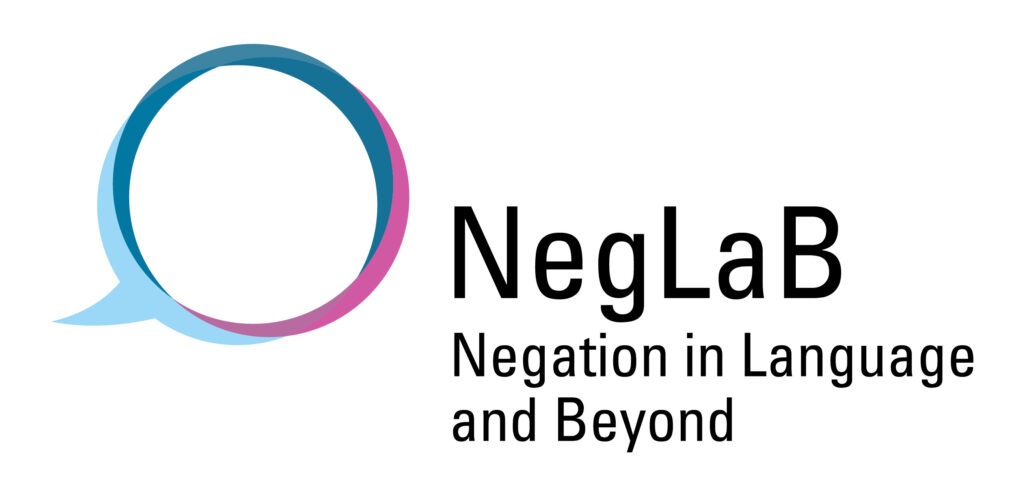Institut für Linguistik
Goethe-Universität Frankfurt
Willkommen
Willkommen am Institut für Linguistik! Auf dieser Seite finden Sie alle wichtigen Informationen, die das Institut betreffen.
Im Oktober 2025 startet an der Universität Tübingen der neue DFG-Sonderforschungsbereich Common Ground (SFB 1718). Wir freuen uns, dass das Institut für Linguistik mit dem Projekt Multimodalität, Ikonizität und der Common Ground: Zum Status von Lautsprache und Geste (PIs: Kathryn Barnes, Cornelia Ebert & Britta Stolterfoht) mit dabei ist.

Sinn und Bedeutung 30 (SuB30) 2025 in Frankfurt
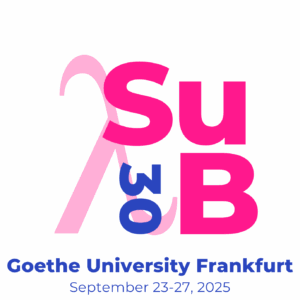
Die 30. Ausgabe der Konferenz Sinn und Bedeutung (SuB30) findet vom 23. bis 27. September 2025 an der Goethe-Universität Frankfurt statt und wird von der Professur für Semantik organisiert.
Die Konferenz umfasst:
-
eine dreitägige Main Session (24.–26. September)
-
zwei eintägige Special Sessions:
Weitere Informationen unter: https://vicom.info/sub30/
Beste studentische Präsentation der MMSYM 2024 aus Frankfurt
Die Mitarbeiterin und Doktorandin Alina Gregori, sowie Vera Wolfrum (Uni Würzburg) gewinnen beide auf der diesjährigen MMSYM den Preis für die beste studentische Präsentation.
Beste studentische Präsentation der Speech-Prosody 2024 aus Frankfurt
Die Mitarbeiterin und Doktorandin Anna Preßler gewinnt auf der diesjährigen Speech-Prosody-Konferenz den Preis für die beste studentische Präsentation.
Jacob- und Wilhelm-Grimm-Preise für internationale Germanistik an Ermenegildo Bidese
Ermenegildo Bidese (Universität Trento) hat 2021 im Fachbereich Neuere Philologien in Frankfurt habilitiert. 2024 erhält er den Jacob- und Wilhelm-Grimm-Preise für die internationale Germanistik des DAAD.
Ende der Seminare = Beginn der Hausarbeiten
Mit dem Ende der Vorlesungszeit beginnt die Arbeit an den Hausarbeiten. Wir bitten alle Studierende, die Hausarbeiten oder Abschlussarbeiten in der Linguistik schreiben, sich an unserem Leitfaden zu orientieren.
Wir feiern Katharina Hartmanns 60. Geburtstag
Während des Geburtstagsworkshops „Syntax in Focus – A workshop in honour of Katharina Hartmann’s 60th birthday“ überreichten wir am 12.01.2024 die Festschrift zu Ehren von Katharina: „To the left, to the right, and much in between“. Sie kann hier kostenlos als Ebook (PDF) heruntergeladen werden.
Wir beglückwünschen das Institut für Linguistik zum neu bewilligten Sonderforschungsbereich NegLaB
Ab April 2024 startet an der Goethe Uni der neue Sonderforschungsbereich der DFG „Negation in Language and Beyond“ (SFB 1629 NegLaB). Das Institut für Linguistik ist mit zahlreichen Projekten am SFB maßgeblich beteiligt.
MA-Student Farbod Eslami Khouzani erhält den diesjährigen DAAD-Preis
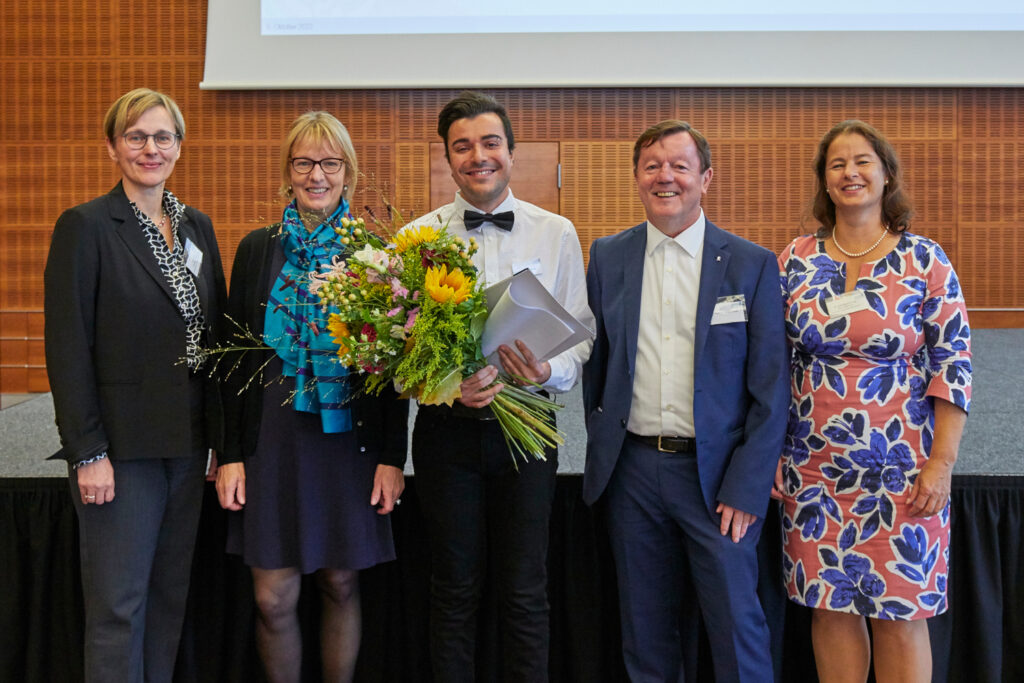
Der MA-Linguistik-Student Farbod Eslami Khouzani (Bild, Mitte) erhielt am 05.10.2023 den diesjährigen DAAD-Preis für internationale Studierende. Gewürdigt wurden seine hervorragenden Studienleistungen wie auch sein gesellschaftliches Engagement. Wir gratulieren herzlich! Mehr Informationen
Prof. Katharina Hartmann und Prof. Frank Kügler nominiert für die beste Promotionsbetreuung
Das Goethe Research Academy for Early Career Researchers (GRADE) verleiht jedes Jahr einen Preis für die beste Promotionsbetreuung. Dieses Jahr sind gleich zwei der Professor*innen aus der Linguistik nominiert: Prof. Frank Kügler und Prof. Katharina Hartmann. Mehr Informationen
Informationen für Studienanfänger*innen
- Dokumente, die nicht per E-Mail verschickt werden können, können in unserem “Hauspostfach 2” in der zentralen Poststelle (IG 257) hinterlegt werden.
- Wichtige Seiten mit aktuellen Informationen:
- Informationen zu Prüfungen (keine „Staatsexamen“):
https://www.pgks.de/
https://www.uni-frankfurt.de/73862497/ZPL___Aktuelles - Informationen fürs Lehramt (ABL):
https://lehrkraefteakademie.hessen.de/lehrerausbildung/pruefungsstellen/frankfurt-am-main/aktuelle-infos
- Informationen zu Prüfungen (keine „Staatsexamen“):
Studium
Das Institut für Linguistik der Goethe-Universität bietet in Zusammenarbeit mit dem Institut für England- und Amerikastudien, dem Institut für Psycholinguistik und Didaktik der deutschen Sprache und dem Institut für Romanische Sprachen und Literaturen zwei sprachwissenschaftliche Studiengänge an, den deutschsprachigen BA Linguistik sowie den englischsprachigen MA Linguistics, die beide ohne Nebenfach studiert werden. Außerdem bietet das Institut Veranstaltungen im Rahmen der Germanistik– und Lehramtsstudiengänge an.
Weiter Informationen:
- Ansprechpartner*innen
- Studienanfänger*innen
- Stundenpläne
- BA Linguistik
- MA Linguistics
- BA Germanistik
- Lehramtsstudium
- Erasmus-Programm (Studium im Ausland)
- Hinweise zu wissenschaftlichen Hausarbeiten
Forschung
Überblick zur Forschung am Institut
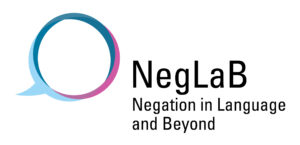 |
|
 |
Das in Frankfurt am Fachbereich 10 (Neuere Philologien) angesiedelte Institut für Linguistik kann besondere Expertise in den Bereichen Sprachstruktur (Syntax und Phonologie), Bedeutung (Semantik und Pragmatik), Psycholinguistik (Spracherwerb, Sprachverarbeitung) und historische Linguistik vorweisen – diese Bereiche werden von international bekannten Forscherpersönlichkeiten vertreten. Darüber hinaus bestehen enge Kontakte und über einzelne Projekte hinausgehende Kooperationen mit den Sprachwissenschaftlern in den Einzelphilologien am Fachbereich (Anglistik und Romanistik), mit der Philosophie (Fachbereich 8), und dem Institut für empirische Sprachwissenschaft am Fachbereich 9 (Sprach- und Kulturwissenschaften).
Neben dem Institut für Linguistik wird Linguistik in Forschung und Lehre auch in anderen Instituten betrieben. Details dazu finden Sie hier:
- Institut für England- und Amerikastudien,
- Institut für Psycholinguistik und Didaktik der deutschen Sprache
- Institut für Romanische Sprachen und Literaturen
- Institut für Empirische Sprachwissenschaften
Das Potenzial der Frankfurter Linguistik liegt vor allem im Bereich der linguistischen Grundlagenforschung. Die rege Forschungstätigkeit wird in diversen Projekten gebündelt.
Institut
Am Institut für Linguistik finden sich die folgenden Professuren:
- Professur Historische Linguistik (Weiß)
- Professur Phonologie (Kügler)
- Professur Psycholinguistik (Bader)
- Professur Semantik (Ebert)
- Professur Syntax (Hartmann)
In der Lehre sind dem Institut für Linguistik die folgenden Professuren angeschlossen:
- Professur für die Didaktik der deutschen Sprache (Grimm, kooptiert)
- Professur für Philosophie (Fuhrmann, kooptiert)
- Professur für Spracherwerb (Schulz, kooptiert)
Hier kommen Sie zur Seite der Geschäftsführung.
Das in Frankfurt am Fachbereich 10 (Neuere Philologien) angesiedelte Institut für Linguistik kann besondere Expertise in den Bereichen Sprachstruktur (Syntax und Phonologie), Bedeutung (Semantik und Pragmatik), Psycholinguistik (Spracherwerb, Sprachverarbeitung) und historische Linguistik vorweisen – diese Bereiche werden von international bekannten Forscherpersönlichkeiten vertreten.
Darüber hinaus bestehen enge Kontakte und über einzelne Projekte hinausgehende Kooperationen mit den Sprachwissenschaftlern in den Einzelphilologien am Fachbereich (Anglistik und Romanistik), mit der Philosophie (Fachbereich 8), und dem Institut für empirische Sprachwissenschaft am Fachbereich 9 (Sprach- und Kulturwissenschaften).
Das Potenzial der Frankfurter Linguistik liegt vor allem im Bereich der linguistischen Grundlagenforschung. Die rege Forschungstätigkeit wird unter anderem in der DFG-Forschergruppe Relativsätze gebündelt.
Das Institut für Linguistik betreut die Studiengänge BA- und MA-Linguistik, und ist für die linguistische Ausbildung im BA-Germanistik und in den Lehramtsstudiengängen (Fach Deutsch) zuständig.
A talk by Philipp Rauth (Saarland)
We are happy to announce a talk by Philipp Rauth (Saarland) in the Historical Linguistics Colloquium. The talk will take place in person.
Date: 12.02.2026
Time: 2pm – 4pm c.t.
Place: IG 2.201
Title: „Restitutive Adverbien im Deutschen“
Abstract:
Die Ambiguität des Adverbs wieder (und vergleichbaren Adverbien in anderen Sprachen) zwischen der restitutiven (1a) und repetitiven Lesart (1b) wurde in den letzten Jahrzehnten intensiv
erforscht (z.B. von Stechow 1996, Fabricius-Hansen 2001).
(1) a. Hannah schließt das FENSter wieder.
b. Hannah schließt das Fenster WIEder.
Die historische Entwicklung und die dialektale Variation stellen jedoch bisher noch ein Desiderat dar. In meinem Vortrag stelle ich eine historisch-dialektale Korpusstudie vor, die (i) zeigt,
dass die erstmals im Althochdeutschen belegte restitutive Lesart von wieder nicht zwingend eine Lehnübersetzung aus dem Lateinischen ist (vgl. Dückert 1957: 6–8), (ii) dass der Pfad des
semantischen Wandels bei solchen Adverbien nicht universell von restitutiv zu repetitiv verläuft (vgl. Zwarts 2019), (iii) dass wieder insbesondere an der westlichen und südlichen Peripherie des deutschen Sprachraums durch eine Vielzahl anderer Lexeme (nochmal, nocheins, herum, umhin, mehr, aber) ersetzt wurde, und dass (iv) schon immer bestimmte syntaktische und se mantische Eigenschaften (Mittelfeldposition, Aktionsart) jeweils eine der beiden Lesarten bevorzugen.
Dückert, Joachim. 1957. ‚Wider‘ und ‚wieder‘ im Neuhochdeutschen. Berlin: Humboldt-Universität, Dissertation.
Fabricius-Hansen, Cathrine. 2001. „Wi(e)der“ and „Again(st)“. In: Caroline Féry & Wolfgang Sternefeld (Hgg.), Audiatur Vox Sapientiae: A Festschrift for Arnim von Stechow, 101–130. Berlin: Akademie.
von Stechow, Arnim. 1996. The different readings of wieder ‘again’: A structural account. Journal of Semantics 13. 87–138.
Zwarts, Joost. 2019. From ‘back’ to ‘again’ in Dutch: The structure of the ‘re’ domain. Journal of Semantics 36. 211–240.
Talk by Christopher Saure (Wuppertal) in the Semantics Colloquium
We are happy to announce a talk by Christopher Saure (Wuppertal) in the Semantics Colloquium.
The talk will take place on campus in IG 4.301.
If you wish to participate virtually via Zoom, please contact Lennart Fritzsche for the link.
Date: February 5, 2026
Time: 4 pm – 6 pm c.t.
Title: The multiperspectival potential of indirect discourse
Abstract:
There is an overall consensus in the literature on perspectivization in language that indirect discourse (ID) does fundamentally not allow perspective shift of deictic expressions in its scope, which are thus obligatorily interpreted from the speaker’s context (e.g., Schlenker 2004). Consequently, research on perspective shift has been primarily focused on free indirect discourse (FID) for its seemingly unique display of multiperspectivity.
In this talk, I provide theoretical and empirical evidence that this prevalent view of ID does not accurately capture its true perspectival potential. Specifically, I argue that ID allows for the same indexicals to shift to the perspective of the reported utterance’s or thought’s original author as FID, namely spatio-temporal adverbs. Crucially, my proposal entails that perspective shift in ID is only unlocked if certain conditions are fulfilled and that the misconceptions about ID stem from a lack of recognition of these conditions in previous works. I discuss three conditions I deem to be significant for facilitating perspective shift in ID – narrative context, discourse prominence and type of propositional attitude verb – and highlight how these factors are relevant for the interpretation of FID as well. Moreover, I present the results of two experimental studies which show that, by taking into account the aforementioned factors, we can (a) increase the acceptability of shifted ID readings; and (b) significantly affect the interpretation of temporal indexicals in German ID.
Finally, I propose that these findings necessitate a uniform treatment of ID and FID. I briefly discuss which of the popular approaches to explain FID’s multiperspectivity – a double-context account (e.g., Schlenker 2004, Eckardt 2014) or a mixed quotation analysis (Maier 2015) – provides the ideal framework for this task.
Tokyo-Frankfurt Phonetics-Phonology Colloquium: 2nd edition
We are happy to announce the second edition of the Tokyo-Frankfurt Phonetics-Phonology Colloquium
Room: Online (please contact Alina at gregori@lingua.uni-frankfurt.de for access)
Date: February 6th
Time: 9-12
The colloquium is a collaboration between the Phonology groups at International Christian University in Tokyo and Goethe University Frankfurt, lead by Seunghun Lee and Frank Kügler. It brings together Early Career Researchs to exchange and discuss about the Phonological topics.
Program:
|
|
|
| 09.00 | Seunghun J. Lee (ICU) & Frank Kügler (GU) Opening |
|
|
|
| 09.05 | Ren Hasegawa (ICU) Tonal Iconicity Study of Xitsonga: observing correlation of weight, speed and height |
|
|
|
| 09.30 | Manuel Lipstein (GU) Timing or privativity? New perception data on the representation of Urban East Norwegian tonal accents |
|
|
|
| 10.00 | Haruka Yatabe (ICU) Disyllabic words in Niigata Japanese follow a Prosodic Template |
|
|
|
| 10.30 | Sotaro Arakaki (ICU) The Phonetic Analysis of the Plosives in the Yonaguni Language |
|
|
|
| 11.00 | Ai Chen (GU) Prosodic prominence on negation in different information structures in German |
|
|
|
| 11.30 | Yeonjun Jeong (ICU) A preliminary study of verb fluency task by an elderly group in an L2 environment: a case of Korean speakers of Japanese |
|
|
|
| 12.00 | Closing remarks |
A talk by Heidi Klockman (University of Agder)
We are happy to announce a talk by Heidi Klockman (University of Agder) in the Historical Linguistics Colloquium. The talk will take place online and in English.
Date: February 5th, 2026
Time: 2pm – 4pm c.t.
Place: https://uni-frankfurt.zoom-x.de/j/68838298277?pwd=e8ONY8oIWw7ani8jprI3bkhdUD8FCy.1
Title: „The noun-to-quantifier shift in English and Polish quantificational pseudopartitives„
Abstract:
This talk will reflect on the process by which a noun becomes a quantifier, drawing empirically on ongoing corpus work into English and Polish quantificational pseudopartitives (QPsPs). The QPsP refers to a binominal construction in which one noun (N1) quantifies over another noun (N2), as in English an ocean of ideas and lots of money or Polish kupaNOM robotyGEN ‘a heap/lot of work’.
The QPsP has been a source of interest for cognitive-functional and generative linguists alike: how does a quantificational meaning arise? What changes do the N1 and QPsP undergo as grammaticalization progresses? What is the underlying syntactic structure producing the morphosyntactic properties of QPsPs? Work on English has investigated such questions primarily through advanced N1s such as lot, bunch, heap, and pile (e.g. Keizer 2007; Langacker 2009; Traugott 2008; Brems 2011; Klockmann 2017). The QPsP has been identified as a locus of change, where the construction undergoes a semantic shift from concrete (e.g. a heap of gravel) to abstract (e.g. a heap of ideas), coinciding with a shift in headedness (from N1 to N2) and changes in the morphosyntax (e.g. verbal agreement with N2) (e.g. Keizer 2007, Brems 2011, Gardelle 2024). In some cases, grammaticalization into a degree adverbial is possible, e.g. a lot nicer (Traugott 2008). Work by Herda (2018, 2019) suggests a similar process may occur in Polish, but the nature of morphosyntactic changes differs.
Previous work paints a fairly coherent picture of the grammaticalization process, but it is limited in scope (primarily advanced N1s) and formalism. In this talk, I discuss ongoing research which attempts to address these gaps. I compare English and Polish QPsPs, focusing on understudied early or mid-stage N1s, such as English ocean and wave or Polish fala ‘wave’ and kupa ‘heap’. These will be shown to vary in terms of having more “noun-like” or “quantifier-like” morphosyntactic properties, and I will present formalisms which attempt to capture the grammaticalization path from noun to quantifier. I will end by reflecting on the consequences of the approach for our understanding of linguistic categories in general.
Talk by Marius Wecker (Bochum) in the Semantics Colloquium
We are happy to announce a talk by Marius Wecker (Bochum) in the Semantics Colloquium.
The talk will take place on campus in IG 4.301.
If you wish to participate virtually via Zoom, please contact Lennart Fritzsche for the link.
Date: January 29, 2025
Time: 4 pm – 6 pm c.t.
The talk will be held in German.
Title: (Diskurse)-Commitments als Elemente politischer Positionierung. Ein theoretischer Ansatz zur Verknüpfung von formaler Pragmatik und Diskursanalyse
Abstract:
Pragmatik und Diskursanalyse repräsentieren zwei unterschiedliche Paradigmen innerhalb der Linguistik, was sich maßgeblich aus ihren jeweiligen ideengeschichtlichen Verortungen erklären lässt. Während die Pragmatik in der angloamerikanischen Tradition der analytischen Philosophie verankert ist, weist die Diskursanalyse – insbesondere in ihrem Rückgriff auf Foucault – deutliche Bezüge zu kontinentalphilosophischen Denkströmungen auf. Ziel der Arbeit ist es, beide Ansätze systematisch miteinander zu verbinden, da davon ausgegangen wird, dass sich ihre unterschiedlichen theoretischen Perspektiven und methodischen Zugänge wechselseitig fruchtbar ergänzen. Zu diesem Zweck greife ich mit dem Table-Model (Farkas & Bruce 2010) und dem Begriff des Commitments (Geurts 2019; Krifka 2015) zwei formale Konzepte der Pragmatik auf und bringe sie in theoretischer Hinsicht mit dem diskursanalytischen Konzept der politischen Positionierung in Verbindung. Die zentrale Arbeitshypothese lautet dabei, dass sich mithilfe des Commitment-Begriffs zeigen lässt, dass Äußerungen in Talkshows im Kontext des Gender-Diskurses primär nicht auf ein Update des Common Grounds abzielen, sondern auf eine Positionierung im politischen Diskurs.


